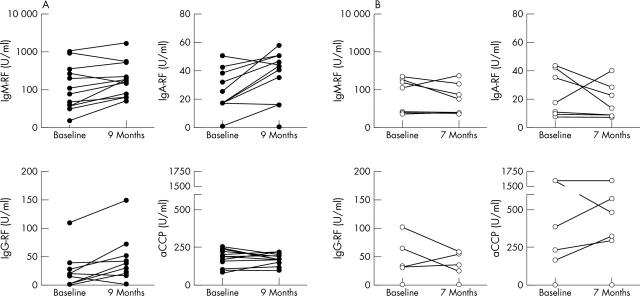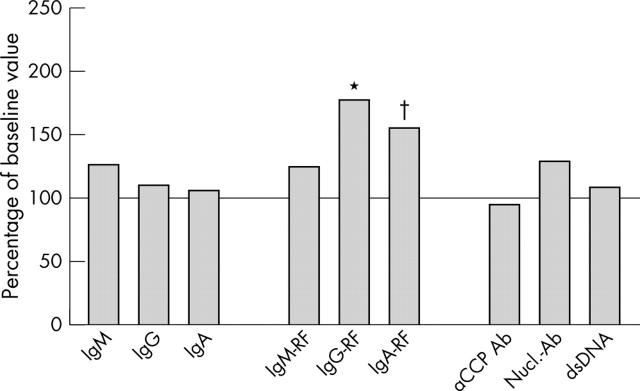Abstract
Methods: 12 consecutive patients with seropositive RA treated with etanercept were studied and followed up for 9 months. Clinical efficacy of treatment was evaluated using the 28 joint count Disease Activity Score (DAS28). Serum samples were collected at baseline and after 9 months and serum immunoglobulin, RF isotypes, and anti-cyclic citrullinated peptide (aCCP), antinuclear, nucleosome, and dsDNA antibodies determined. For comparison 7 patients with seropositive RA treated with adalimumab were studied.
Results: DAS28 decreased significantly after the first month and then was constant for the whole study (5.7 (0.3) v 3.8 (0.2), p⩽0.000). Serum IgA-RF and IgG-RF increased significantly after 9 months' etanercept treatment (mean (SEM) IgA-RF rose from 19.5 (4.8) to 30.5 (5.9) IU/ml, p⩽0.01; IgG-RF from 20.6 (8.1) to 33.8 (11.5) IU/ml, p⩽0.04). Serum levels of total immunoglobulin and specific autoantibodies remained unchanged during the study. In patients treated with adalimumab, no significant changes in serum levels of RF isotypes and aCCP antibodies were seen.
Conclusion: Etanercept, although effective in treating the clinical symptoms of RA, seems to have a pivotal effect on RF-producing B cells either directly or indirectly.
Full Text
The Full Text of this article is available as a PDF (73.3 KB).
Figure 1.
Individual serum levels of IgM-RF, IgG-RF, IgA-RF, and aCCP before and after 9 months of treatment with etanercept (A) and before and after 7 months of treatment with adalimumab (B). IgM-RF values are shown on a logarithmic scale.
Figure 2.
Serum levels of total IgM, IgG, IgA, RF isotypes and specific autoantibodies as a percentage of the baseline value after 9 months of etanercept treatment. *p⩽0.04; †p⩽0.01 by Wilcoxon's test.




